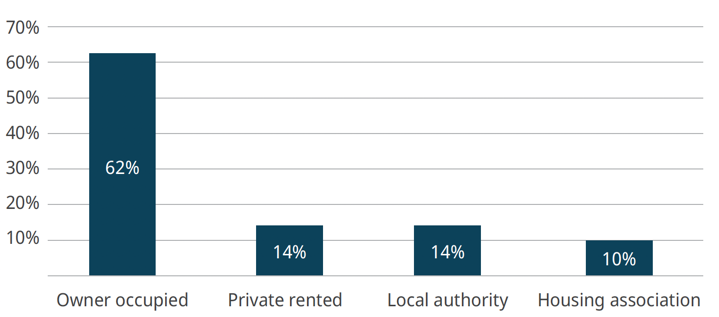Social housing sector: Youth engagement
This study was commissioned by the Scottish Government in order to gain
a better understanding of the baseline of youth engagement in the Scottish
social housing sector.
5. Context
5.1 The research below considers key population and household trends, and details housing policy and legislation related to youth engagement in the Scottish social housing sector.
5.2 Population figures
According to the National Records of Scotland the population of Scotland in 2021 was estimated to be 5.5 million – with 1.3 million people aged between 16-34 (24%).
5.2.1 As of 2021, Glasgow City Council area recorded the highest population of people aged between 16-34 at 208,000 (16% of Scotland's 16-34) and Edinburgh City Council area followed at 166,000 (13% of Scotland's 16-34). The Orkney Islands recorded the lowest population of people aged 16-34 at 4,313 (less than 1% of Scotland's 16-34).
5.3 Dwellings in Scotland
As of 2019, figures from the Scottish Household Survey show 62% of dwellings in Scotland being owner-occupied; 14% being private rented or where the household is living free; and 24% being social rented properties (14% local authority housing stock and 10% housing association stock).

5.3.1 The same figures show that 23% of the population aged between 16-34 lived in social rented properties at that time in Scotland.
5.4 Housing policy and legislation
Anyone 16 or over has a right to be admitted to a housing list for social housing in Scotland. Section 19(1) of the Housing (Scotland) Act 1987 – substituted by section 9 of the Housing (Scotland) Act 2001 - sets out this legal right.
An individual aged 16 or over should have fair and open access to a housing list. Housing organisations should never discourage applicants from applying for housing and having their housing needs assessed, based on age or any other characteristic.
5.4.1 The Housing (Scotland) Act 2001 introduced a statutory framework for tenant participation in Scotland, giving tenants and Registered Tenants Organisations a right to tenant participation and consultation in the social rented housing sector. These rights were further enhanced in the Housing (Scotland) Act 2010 - with the introduction of the Scottish Social Housing Charter (the Charter) and the establishment of the Scottish Housing Regulator which monitors landlord performance against the Charter's outcomes and standards.
5.4.2 The Equality Act 2010 brought together previous anti-discriminatory legislation under one Act. It legally protects people from discrimination in the workplace and wider society. It sets out nine protected characteristics of: age, disability, gender reassignment, marriage and civil partnership, pregnancy and maternity, race, religion or belief, sex and sexual orientation.
As part of the Equalities Act 2010, the public sector equality duty came into force across the United Kingdom in April 2011. This duty means that public bodies must consider all individuals when carrying out their day-to-day work in shaping policy, in delivering services and in relation to their own employees. It also requires that public bodies have due regard to the need to:
- Eliminate discrimination;
- Advance equality of opportunity; and
- Foster good relations between different people when carrying out their activities.
5.4.3 The Scottish Social Housing Charter (the Charter) sets out the standards and outcomes that all social landlords should achieve when performing their housing activities. The Charter was formally introduced in 2012 and is reviewed regularly. It does not prescribe how landlords should involve tenants - including young tenants - in participation and scrutiny activities. However, the Charter outcomes of Equalities, Communication, and Participation sets the framework for how social housing organisation should deliver their services within the context of this study.
Equalities requires social landlords to perform all aspects of their housing services so that every tenant and other customer has their individual needs recognised, is treated fairly and with respect, and receives fair access to housing and housing services. This outcome describes what social landlords - by complying with equalities legislation - should achieve for all tenants and other customers.
Communication requires social landlords to manage their businesses so that tenants and other customers find it easy to communicate with their landlord and get the information they need about their landlord, how and why it makes decisions and the services it provides. This outcome covers all aspects of landlords' communication with tenants and other customers, including making it easy for tenants and other customers to access information, participate in consultations, make complaints, and provide feedback on services, using that information to improve services and performance and letting people know what they have done in response to complaints and feedback.
Participation requires social landlords to manage their businesses so that tenants and other customers find it easy to participate in and influence their landlord's decisions at a level they feel comfortable with. This outcome describes what landlords should achieve by meeting their statutory duties on tenant participation. It covers how social landlords gather and take account of the views and priorities of their tenants, other customers and bodies representing them such as registered tenant organisations; how they shape their services to reflect these views; and how they help tenants, other customers and bodies representing them such as Registered Tenant Organisations to become more capable of involvement – this could include supporting them to scrutinise landlord services.
5.4.4 The Scottish Government's Guide to Successful Tenant Participation (2019) provides a good practice guide that is useful to tenants, tenant groups and housing organisation staff who want to know more about tenant participation and would like to develop their engagement and scrutiny activities further.
Contact
Email: TPAdminsupport@gov.scot
There is a problem
Thanks for your feedback